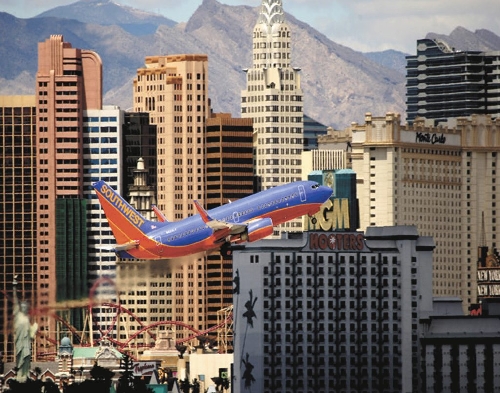Las Vegas lags U.S. economic strides
Despite an occasional sprinkling of positive economic news, Las Vegas lags the national recovery that has gained some momentum in the past two quarters, a report from UNLV's Center for Business and Economic Research stated.
Virtually all key indicators of business activity in the Las Vegas Valley are down to start the year, the research center's first-quarter Southern Nevada Business Confidence Index showed.
Unemployment rose to 13.9 percent, hotel occupancy rates dipped into the low 70 percentage range, and room rates have been sharply discounted from two years ago. Taxable sales declined by double-digit rates.
The opening of the $8.4 billion CityCenter megaresort in December stimulated visitor volume in the first quarter, but those extra visitors were spread through more rooms.
"The current recession nationally was heavy into construction, leisure and hospitality, and finance, and we have two of those three in Vegas," said Stephen Miller, chairman of the Economics Department at University of Nevada, Las Vegas. "In order to get out of our situation, we need visitors to come back."
Casinos and hotels are still under financial stress because visitors aren't spending as much during trips to Las Vegas, he said. One bright spot was a 32.9 percent surge in February gaming revenues on the Strip, boosted largely by the Super Bowl and Chinese New Year.
Americans' savings rate jumped dramatically during the financial crisis, but that's starting to come back down, Miller said.
"That's a sign that pocketbooks are unfreezing, and that's good for Vegas," he said. "We know hotels are cutting their rates to bring visitors. Vegas was hit very hard. It's unlikely we'll go back to the boom years."
Respondents to the Southern Nevada Business Confidence Index survey are not generally optimistic about the near-term potential for economic recovery.
Business owners appear to be well aware of the economic difficulties they face. When asked how they think local economic conditions will change in the next quarter, 46 percent said they would remain the same, 20 percent thought they would improve, and 34 percent felt they would worsen.
Las Vegas economic consultant John Restrepo said the local economy is in a state of "purgatory," with some indicators flattening out and others simply showing a decreased rate of decline.
"The question in this recovery is what will be the new norm, what will the recovery look like," Restrepo said Monday. "We may stabilize at higher levels of unemployment and lower levels of economic activity, what we saw prior to 2008."
The consensus is that the recession is in a jobless recovery, he said. Las Vegas lost 50,300 jobs since February 2009, about 6 percent of its total employment. The work force is roughly equivalent to what it was six years ago.
Regaining those jobs won't be easy, Restrepo said.
"One, we don't have a very diversified economy, and two, the concentration of our economy is in an industry based on discretionary spending of outsiders," he said. "Discretionary spending comes back the slowest in recovery, especially in our economy. People don't go out to as many dinners, maybe they come to Vegas four times a year instead of five, and they eat at the buffet instead of the high-end restaurants."
Businesses are concerned with sales and profits in the coming quarter, the UNLV survey found. Twenty-six percent of respondents forecast a decline in sales, while 38 percent predicted an increase. Similarly, 31 percent think profits in their industry will shrink, 38 percent felt profits would be stable, and 31 percent projected growth in profits.
UNLV Economics Department Chairman Miller said he's seeing some signs of recovery, particularly in the housing market, but not enough to boost construction employment. The construction sector continues to lose ground in Las Vegas, he said.
Other trends to watch include the rising price of gasoline, the decline in taxable retail sales and inconsistent tourism figures, economic consultant Restrepo said. While visitor volume rose 4 percent in January from a year ago, gaming revenues declined by 2.2 percent, and the hotel occupancy rate dropped 80 basis points, or 0.8 percentage points.
Also, average daily room rates fell 4.9 percent to under $100, and convention attendance plummeted 16.4 percent to 449,917 in January.
Las Vegas commercial developer Jeff LaPour said he sees positive trends in real estate prices and capitalization rates, a function of the property's purchase price and its net operating income.
He cited a report from Washington, D.C.-based Urban Land Institute that said banks and financial institutions have been refusing to dump troubled real estate mortgages and assets at "fire sale" prices. Instead of foreclosing on properties, they have focused on restructuring and reworking loans.
As one workout specialist at a recent ULI forum said, "If commercial real estate is the next shoe to drop in the United States, then it's already dropped. People just didn't hear it."
Contact reporter Hubble Smith at hsmith@ reviewjournal.com or 702-383-0491.

















